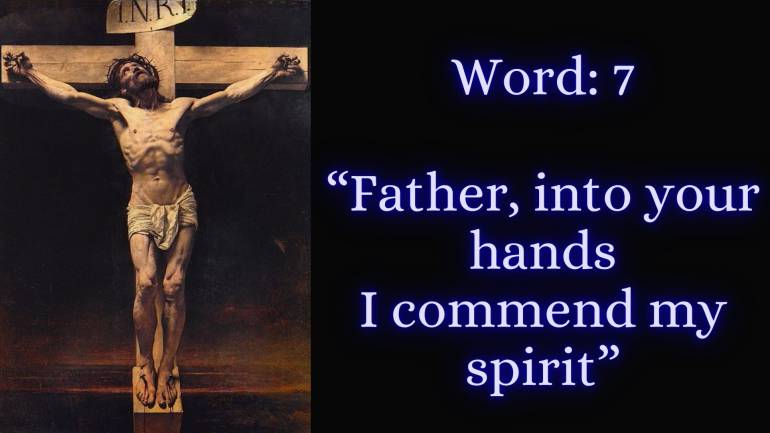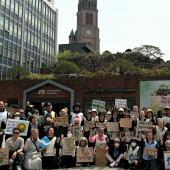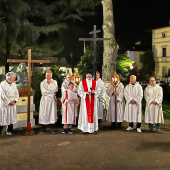The SEVEN Last Words of Jesus. Word:7 - “Father, into your hands I commend my spirit”

A. Text: Luke 23:44–46
“It was now about noon and darkness came over the whole land until three in the afternoon because of an eclipse of the sun. Then the veil of the temple was torn down the middle. Jesus cried out in a loud voice, “Father, into your hands I commend my spirit”; and when he had said this he breathed his last.”
B. Exegesis:
1. “darkness came … veil of the temple was torn”
The crucified Jesus is scoffed and mocked by not a few:
i. by rulers, “He saved others; let him save himself if he is the Christ of God, his Chosen One!”;
ii. by soldiers, “If you are the King of the Jews, save yourself!”;
iii. and by one of the criminals, “Are you not the Christ? Save yourself and us!”
It is at this time that God intervenes, bringing judgment upon those who thus derided Jesus and demonstrating that the Crucified One is His Christ, His Chosen One. So God intervenes: darkness comes over the whole land; the veil of the Temple is torn down the middle.
2. “cried out in a loud voice”
As God intervenes, Jesus reacts to these divine interventions: He cries out in a loud voice, “Father, into your hands I commend my spirit.” He reacts with the words of the Psalmist – Psalm 31,6: “Into your hands, I commend my spirit; you will redeem me, O Lord, O faithful God.”
The psalmist in 31 describes in pathetic words his extreme misery and affliction; he is overwhelmed by evil people. But he prays to God, albeit in distress. He prays for heavenly aid with unshaken confidence in God’s goodness.
Jesus makes these words of the Psalmist His own. He reacts to the divine interventions surrounding Him by placing His filial confidence and trust in God’s loving care. Hence Jesus’ last words are those of trust. In distress, He too prays to God in trust.
More importantly, this is a prayer that a Jewish mother taught her child to pray as the last prayer for the night. It is interesting to think that Mary the mother of Jesus also taught Jesus this prayer to be prayed every night. When Jesus came to a mature consciousness as a child, He became aware of His special relationship to God His Father. With this awareness growing from His very childhood – manifest at the age of twelve at the Temple where He first refers to God as His Father (Luke 2,50) – Jesus was always anxious to do His Father’s will. Hence this prayer He recited every night was not a mere ritual. After doing His Father’s will every day, then before He slept He could really and truly commend His whole self to God. Now at the last night of His earthly life, after having done His Father’s will even until the death on the cross, He could for the last time calmly commend His whole life and life’s work to the Father. There is no doubt that offering His dear Son’s life was indeed acceptable to His Father.
3. “Father”
In His very first words, Jesus referred to God as “Father” – “Did you not know that I must be in my Father’s house.” At the end of His earthly life, Jesus now makes the same address, “Father.”
At the beginning of His agony on the Mount of Olives, Jesus prayed “Father” – “Father, if you are willing, take this cup away from me; still, not my will but yours be done” – and now at the climax of His agony at the place called the Skull, He prays “Father.”
At the very moment Jesus was crucified He prayed “Father” – “Father, forgive them, they know not what they do” – and now at the moment He dies, He prays, “Father” – “Father, into your hands I commend my spirit.”
4. “into your hands”
The scribes and chief priests sought to lay their ‘hands’ on Jesus (Luke 20,19). Jesus Himself predicted that the Son of Man would be given over into the ‘hands’ of men (Luke 9,44). Now Jesus proclaims that it is into the ‘Hands of God the Father’ that He places over His spirit.
5. “my spirit”
The spirit is a partial component of human beings; it is the living self or life power that goes beyond death.
But in Jesus’ case, the spirit goes beyond the usual anthropological definitions. The spirit is all that He is and has. Jesus was conceived by the Spirit that came upon His mother. At His baptism, the Spirit descended upon Him in a bodily form. He was full of the Spirit at Nazareth. He was always led by the Spirit as He moved about in Palestine.
Accordingly, when Jesus places over His spirit to the Father, He is bringing round to its place of origin His life and mission – as stated by L. FELDKAMPER, Der betende Jesus als Heilsmittler nach Lukas (Veroffentlichungen des Missionspriestererseminars St. Augustin bei Bonn 29; Bonn 1978) 277-279.
C. Application:
6. These words of Jesus have offered many a way of meeting death in peace. Once again, the first of the followers of Jesus on this path was the martyr Stephen. In Acts 7,59-60 we see him dying similarly, shouting a loud cry, “As they were stoning Stephen, he called out, ‘Lord Jesus, receive my spirit.’”
The picture of the death of Jesus was, thus, impressed in the minds of the early followers of Jesus. As they came to die, especially as martyrs, their sentiments imitated the sentiments of their Lord when He faced death. The Early Church always looked back and imitated Jesus her model, example or point of reference.
7. In dire moments of mockery, brutality, suffering and death we too must trust in the Lord, the light that never dies out and be submissive to His will like Bonhoeffer.
Dietrich Bonhoeffer was executed by the Nazis shortly before Easter. This Lutheran pastor and author of a modern classic, The Cost of Discipleship, vociferously opposed Hitler’s euthanasia programme and genocide of Jews. Having been accused of being associated with the July 20 plot to assassinate Hitler, he was arrested. He had just concluded his final Sunday service. At the arrest, he said, “This is the end—for me, the beginning of life.”
Twenty-one days before Hitler committed suicide, Bonhoeffer was tried. Stripped of his clothing and led naked into the execution yard, he was hanged. This is what Eberhard Bethge, the prison doctor says of Bonhoeffer’s death: “I saw Pastor Bonhoeffer … kneeling on the floor, praying fervently to God. I was most deeply moved by the way this lovable man prayed, so devout and so certain that God heard his prayer. At the place of execution, he again said a short prayer and then climbed the few steps to the gallows, brave and composed. His death ensued after a few seconds. In the almost fifty years that I worked as a doctor, I have hardly ever seen a man die so entirely submissive to the will of God” (Eberhard Bethge, Dietrich Bonhoeffer: A Bibliography, 927). Thus Jesus’ death-bed legacy lasted.
Bonhoeffer on a weekend getaway with some children of Zion's Church, 1932
8. “Is death a leap into a void?” questions Pedro Arrupe, S.J. and replies, “Of course not. It is to throw yourself into the arms of the Lord.”
These words of the twenty-eighth Superior General of the Society of Jesus (1965–83) and the second founder of the Society emerge from a particular existential situation, which goes back to Latin America, the world of the future Jesuit Pope. On 20 June 1977, the White Warriors Union death squad threatened to kill all 47 Jesuits serving in El Salvador unless they abandoned their work with the poor and left the country within a month.
After consulting with the Jesuit community in El Salvador, Arrupe replied “They may end up as martyrs, but my priests are not going to leave because they are with the people” (Emily Wade Willy, Archbishop Oscar Romero: The Making of a Martyr, 106).
A few months earlier, Jesuit Father Rutilio Grande, a proponent of liberation theology, was assassinated in El Salvador. On 16 November 1989, six Jesuits, Ignacio Ellacuría, Armando Lopez, Joaquin Lopez y Lopez, Ignacio Martín-Baró, Segundo Montes and Juan Ramon Moreno, along with their housekeeper, Julia Elba Ramos and her daughter, Celina, would be murdered at the Jesuit University of Central America. Others also suffered martyrdom: Archbishop Saint Óscar Romero, who evolved into a progressive stance, was gunned down whilst celebrating the Eucharist on 24 March 1980.
Lay missionary Jean Donovan, Ursuline Sr. Dorothy and Maryknoll sisters Maura Clarke and Ita Ford were beaten, raped, and murdered by non-uniformed members of the Salvadoran National Guard on 2, 1980. They joined some 75,000 Salvadorans who were killed during this troubled period.
All the while, Arrupe continued to support and pray for those people who were willing to lay down their lives to help the poor initiate change, which happened in his days.
Father-General Pedro Arrupe, SJ shines the shoes of a shoeshine boy in South America.
9. Now we know why the inimitable ‘Aruppe product on the Vatican Hill’ urged his priests, hours after Italy was placed on a nationwide lockdown, to “have the courage” to go out and help those sickened by the coronavirus: “Let us pray to the Lord also for our priests, that they may have the courage to go out and visit the sick to bring them the comfort of God and to bring them the Eucharist and to show solidarity with the medical staff and volunteers in the work they do.”
Thus the Holy Father, without distancing himself from the existing situation, showed a ‘way out’ with his words of wisdom and prayer. In other words, he directed the Church ‘to be where it should be’ and to do ‘what it should do’ at this hour, the death bell tolls for the whole world. Nero fiddled when Rome burned, but the heart of Francis seems to be burning when Rome is facing this Great Fire.
Priests heeded the voice of their buon pastore, despite media criticism. They started happily valiantly serving the sick, snubbing the natural fears of being infected and killed. De facto, they were infected and killed in scores!
Pope Francis praised those priests for “creativity” in tending to their flocks, especially in the region of Lombardy, northern Italy, where thousands have been hospitalized or are in quarantine. He said their efforts demonstrated there are “a thousand ways to be near” to the faithful, if not physically. He also praised ordinary Italian workers in grocery stores and pharmacies, as well as police, for delivering essential services amid the crisis.
“I want to pray for all of the priests, the creativity of priests,” the pope said in his March 15 Angelus address, saying he has heard numerous stories of priests in Italy’s northern Lombardy region, “who think of a thousand ways to be with the people so that the people don’t feel alone. A big thank you to you priests.”
On Friday, after the Diocese of Rome reversed its decision a day earlier to close all churches in a bid to stop the spread of the coronavirus, a letter signed by the Pope’s personal secretary, but which is believed to have been written by him, was sent to priests urging them to bring the sacraments to those who ask amid Italy’s strict lockdown.
“In the epidemic of fear that we are all living due to the coronavirus pandemic, we risk behaving more like wage-earners than as pastors,” he said in the letter, pondering aloud how many people “will certainly abandon the Church, when this nightmare is over, because the Church abandoned them when they were in need.”
This type of behaviour, which might be ‘eccentric’ in the eyes of the world, comes ultimately from the very Mind of Jesus, who saw death as a commendation of His spirit into the Hands of His Father. When life is seen or defined from this perspective on death, we can hardly stop that life from being transformed into ‘Jesuanic’ or Jesus-like.
10. This prayer, “Father, into your hands I commend my spirit”, is a prayer, that both Jews and Christians, priests and religious, could whisper to God as the last prayer for the night. It would be more meaningful if we have also striven like Jesus to do the will of God earnestly and well every day. Then, as it was for Jesus, we would also be truly blessed if we could at the last moment of our life, before we sleep the sleep of eternal sleep be able to utter this prayer as the last prayer of our life.
Radio Veritas Asia (RVA), a media platform of the Catholic Church, aims to share Christ. RVA started in 1969 as a continental Catholic radio station to serve Asian countries in their respective local language, thus earning the tag “the Voice of Asian Christianity.” Responding to the emerging context, RVA embraced media platforms to connect with the global Asian audience via its 21 language websites and various social media platforms.














